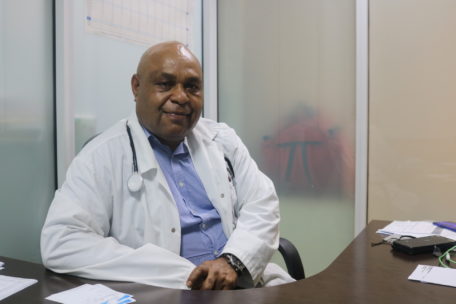In this series, Dr Joseph Sand discusses the alarming health concerns related to chest pains. We investigate the origins of chest pains, the types that occur and what you can do to detect Chest pains and prevent from getting out of hand.
Chest pains have become a common issue in PNG because of the kind of lifestyle we have adopted. Excessive consumption of alcohol, smoking, less exercise, obesity, unhealthy diet regimes, and emotional stress are some of the lifestyle contributions to chest pains and an overall poor health status. Even family history of heart attacks or stroke, if not carefully monitored, can contribute to severe chest pains and heart attacks. Within the last few years there has been a rise in people admitted through to the hospital for chest pains or worse, succumbing to their fate.
Chest Pains and their origin
Different types of Chest pains include, chest pains that come from the heart, lungs, the stomach, the oseophagus. However, in medicine, any kind of chest pains is considered a heart attack or of cardiac origin until proven otherwise.
Some other risk factors that contribute to chest pains are:
- Blood pressure issues
- Diabetes
- Cholesterol
- Obesity
- Smoking
- Family History of Heart attacks
In any case, once you feel a chest pain, no matter how light or heavy, needs to be brought to the hospital for further investigation.
It is sometimes difficult to tell the difference between severe heart burns, chest pain and even heart attacks. It is important to understand how they vary and when to get immediate help.
We can classify chest pains as being derived from the following origins:
- Heart or Cardiac Origin
Angina – Angina also called ischemic chest pain is a symptom of coronary artery disease that can contribute to heart attack or stroke. Angina is classified as a chest pain of the heart origin. Angina happens when there is not enough blood flow or oxygen travelling to the heart muscles.
Real Heart Attack – A heart attack is a serious medical emergency in which the supply of blood to the heart is blocked. This requires immediate medical attention, and the patient must be rushed to the hospital in that instance.
Pericarditis – Inflammation of pericardium (sac/covering surrounding heart). Causes are due to viral infections or heart attacks and can cause sharp pains.
- Stomach origin
Gastritis – Gastritis is an inflammation to the lining of your stomach and can be caused by an irritation due to excessive alcohol consumption, chronic vomiting, stress, or the misuse of certain medications such as aspirin and other anti-inflammatory drugs. Gastritis can cause chest pains, shortness of breath, racing heartbeat, or dizziness and nausea.
- Esophagus origin
Esophagitis – This is any inflammation or irritation of the esophagus that is caused by an ´acid reflux’ or stomach acids backing up to the esophagus, infection, oral medication or allergies. Heartburn, or acid indigestion, is a symptom of acid reflux. The esophagus lies just behind the heart, and that is where the burning sensation is felt.
- Lung Origin
Pleuritis – Pleuritis is a condition in which the pleura becomes inflamed. Pleura is the two large thin layers that separate your lungs from the chest wall. The pleura becomes inflamed when you have a viral infection like the flu, or any bacterial infection like pneumonia. Since there is an inflammation near your chest walls, it causes sharp chest pains and discomfort when breathing.
All these conditions, if not identified and diagnosed can be life threatening and should be brought to medical attention for further investigation or diagnosis.
If you are over 40 years of age, and have the risk factors mentioned above, schedule regular checks with your doctor or come see us at PPH.
This is the first part to written article series on the topic of Chest Pains.
Article by: Dr Joseph Sand

Dr Joseph Sand is a senior medical officer and the Director of ICU, General Ward and CVIP at Paradise Private Hospital. He has vast experience and worked abroad in Australia in Surgery and Emergency and brings a wealth in his profession working in reputable hospitals like the Royal Melbourne Hospital, Wangaratta Hospital, Wodonga Regional Hospital, Alice Springs Hospital and the National Home Doctor Service. He is home grown, having obtained his MBBS at the University of Papua New Guinea.
The information, including but not limited to, text, graphics, images, and other material contained on this website are for informational purposes only. No material on this site is intended to be a substitute for professional medical advice, diagnosis, or treatment.


